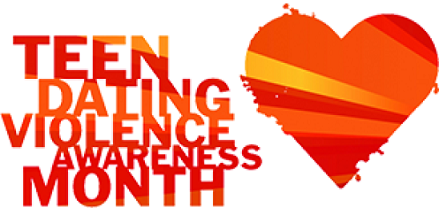February is Teen Dating Violence Awareness & Prevention Month
February brings us Valentine’s Day, a day when dating and romance is celebrated. However, beyond the hearts and roses, chocolates and cards, we also take a moment’s pause to focus on another important cause in February—Teen Dating Violence Awareness and Prevention Month. Teen dating violence — also called intimate relationship violence or intimate partner violence among adolescents or adolescent relationship abuse — includes physical, psychological or sexual abuse, harassment, or stalking of any person ages 12 to 18 in the context of a past or present romantic or consensual relationship.
Teen dating violence (TDV) is more specifically defined as a pattern of abuse or threat of abuse against teenaged dating partners, occurring in different forms, including verbal, emotional, physical, sexual and digital. TDV doesn’t discriminate and occurs across diverse groups and cultures. Although the dynamics of TDV are similar to adult intimate partner violence (aka domestic violence) the forms and experience of TDV, as well as the challenges in seeking and providing services, makes the problem of TDV unique (www.nrcdv.org/dvam/tdvam).
Adolescence is a time when most teens are meandering down the winding road of finding themselves, navigating peer relationships, and often experiencing their first dating/intimate relationships. As a teen, those first romantic relationships are a time that can be filled with butterflies and magic, but also with uncertainty and confusion. While we can all agree that everyone deserves to be in a healthy and safe relationship, statistically this is not the case. It has been reported that 1 in 5 teens in a dating relationship report being hit, slapped or pushed by their partner (www.LoveIsRespect.org).
How do these unhealthy and often unsafe romantic relationship patterns develop so early on in life? Well, we know that teens that have been exposed to unhealthy relationships may be more likely to engage in relationships that are of similar quality to those they were privy to as they were developing. Witnessing physical, verbal and emotional abuse as children may deeply lodge these interactional patterns into our beings; without intervention, these behaviors often unknowingly play out in relationships throughout our lives and there is great risk that the cycle of violence risk may be passed on from generation to generation.
It is very common to have mixed feelings about someone who is violent towards you, but it is important to find someone to talk to who will believe you and respect your feelings. While everybody gets angry sometimes, there are times when some people get so angry they totally lose control; they may throw things, punch the wall, or hit somebody. They may even be sorry afterwards. Remember: abusive relationships tend to get worse, not better. Resist the temptation to give the abusive person “one more chance” (www.teenlineonline.org). If you, a family member, or friend is experiencing an unsafe teen relationship, it is time to seek help. If your own behavior is out of control or violent, it is also time to seek help.
And to all the adults out there reading this, be aware that teens may not feel safe reaching out to make sense of their new relationships for fear of being told cliché adages about love or being made to feel like their experiences are not as valid as those of an adult. Be open and compassionate. Listen to the little moments in a way that proves you can be trusted with the big ones. Don’t ignore clues. Be an ally. It’s through the presence of safe and trusting relationships that teens will feel like they are able to take that brave and heroic next step of asking for help.
In addition to the sources given above, here are some other sites with information, resources and ways to get help:
http://www.loveisrespect.org/resources/teendvmonth/
https://healthfinder.gov/NHO/FebruaryToolkit2.aspx
http://youth.gov/feature-article/national-teen-dating-violence-awareness-and-prevention-month
https://www.cdc.gov/violenceprevention/pdf/teen-dating-violence-factsheet-a.pdf



